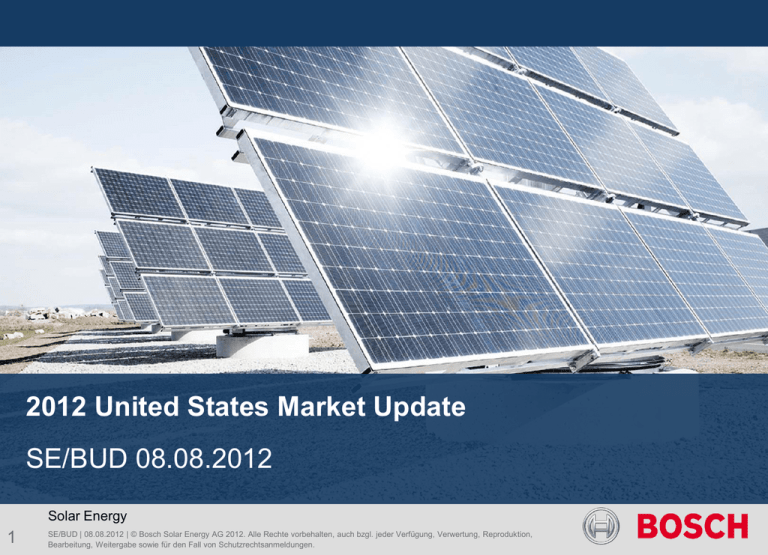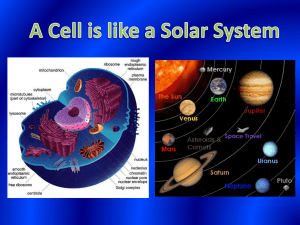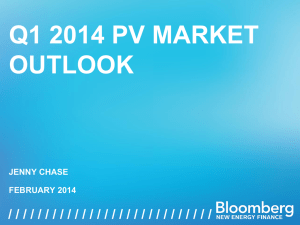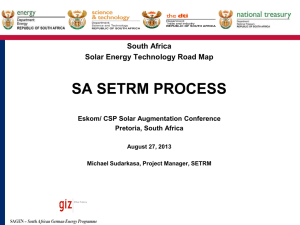
2012 United States Market Update
SE/BUD 08.08.2012
Solar Energy
1
SE/BUD | 08.08.2012 | © Bosch Solar Energy AG 2012. Alle Rechte vorbehalten, auch bzgl. jeder Verfügung, Verwertung, Reproduktion,
Bearbeitung, Weitergabe sowie für den Fall von Schutzrechtsanmeldungen.
Agenda
1. Market Model and Business
Landscape
1.1 Market Update and
Overview
1.2 Subsidy Landscape
1.3 Overall Market Model
1.4 Market Model by Segment
1.5 Competitive Landscape
1.6 Residential System Finance
2. State Rankings
2.1 Overview of Methodologies
and Research
2.2 State Rankings for
Wholesale and Retail
Markets
2.3 Comparison with 2009
Results
2.4 Implications for Bosch
3. Public Perception of PV in US
Market
3.1 Public Opinion Research
3.2 2012 Election Implications
Solar Energy
2
SE/BUD | 8/8/12 | © Robert Bosch GmbH 2012. All rights reserved, also regarding any disposal, exploitation, reproduction, editing,
distribution, as well as in the event of applications for industrial property rights.
1.1 US Market Overview
1. 2.0 GW installed by end of 2011, over 3 GW expected by end of 2012
2. 30 % Federal Cash Grant awarded over $1.8B (~1.26 GW) before expiring at end of
2012
3. Growth in all market segments from 2010-2011 – largest growth in Utility Segment
(282%)
4. The rise of the utility segment has caused 3 main downstream channels to grow:
module suppliers with internal installation, EPCs, and direct procurement by
utilities
5. Residential leasing and PPAs are driving growth in the Residential Market
6. Market is going to be driven by 2 main segments: Distributed-generation (DG)
systems below 1 MW and utility-led large scale projects
7. Big questions / Issues for future solar market – uncertainty due to ITC, 2012
election, and anti-dumping tariffs
Solar Energy
3
Sources: SolarBuzz Q1/2’12 Report
SE/BUD | 8/8/12 | © Robert Bosch GmbH 2012. All rights reserved, also regarding any disposal, exploitation, reproduction, editing,
distribution, as well as in the event of applications for industrial property rights.
1.2 US Financial Incentive & Subsidy Landscape
Federal
Level
ITC (Investment Tax Credit): 30% tax credit for solar energy systems installed on or
before 31/12/16. Credit reverts to 10% thereafter.
Rebate Programs: Offer subsidies for PV system installations based on capacity or
size.
Feed-in-tariff: Long-term contracts where a fixed amount of money is paid to electricity
generator by the utility for the amount of energy they feed into the grid.
SRECs (Solar Renewable Energy Credits): State markets that utilize solar energy
production credits so that utilities can purchase a certain amount of their electricity from
solar generators.
Solar Lease: Property owners lease solar PV systems from a provider with little to no
upfront costs.
PPA (Power Purchase Agreements): Financial Agreements in which one party owns the
system and generates electricity which is sold to a purchasing party
Net Energy Metering: Customer-generator receives a financial credit for power that is
generated by their onsite solar energy system and fed back to the utility.
Solar Energy
4
SE/BUD | 8/8/12 | © Robert Bosch GmbH 2012. All rights reserved, also regarding any disposal, exploitation, reproduction, editing,
distribution, as well as in the event of applications for industrial property rights.
State and Local Level
RPS (Renewable Portfolio Standard): Require state utilities to generate a certain
percentage of power utilizing renewable energy.
1.2 SREC (Solar Renewable Energy Credit)
SRECs create markets for solar energy production in states with solar
set-asides in their RPS
Each year, utilities must obtain a certain percentage of the electricity
they sell from a solar energy source to avoid a non-compliance fee by
either producing it themselves or purchasing SRECs from third parties
1 SREC = 1 MWh of solar electricity produced
Supply and Demand for each state market dictate prices of SREC credits
Demand determined by state RPS solar requirement
Supply determined by amount of SRECs produced by solar energy
systems within a state
Non-Compliance payment acts as SREC price ceiling
Pricing varies by state : $150/MWh (NJ) - $295/MWh (D.C.)
Solar Energy
5
SE/BUD | 8/8/12 | © Robert Bosch GmbH 2012. All rights reserved, also regarding any disposal, exploitation, reproduction, editing, distribution,
as well as in the event of applications for industrial property rights.
1.3 US Market Model 2011-2016: IMS and SolarBuzz Research
12
10
8
6
4
2
0
2011
2012
Conservative
2013
2014
Most-Likely
2015
2016
Optimistic
14
150%
140%
130%
120%
110%
100%
90%
80%
70%
60%
50%
40%
30%
20%
10%
0%
12
Installed Capacity (GW)
150%
140%
130%
120%
110%
100%
90%
80%
70%
60%
50%
40%
30%
20%
10%
0%
10
Growth Rate
Installed Capacity (GW)
14
8
6
4
2
0
2011
2012
2013
Balanced Energy
2014
Most Likely
Scenarios differ based on variables affecting demand:
Policy – ITC, state RPS requirements
Module Supply – overall system cost
Finance – investment to finance PPAs and tax equity market
Solar Energy
6
Source: Solarbuzz Q2’12 ,IMS Q2’12
Internal | SE/BUD | 8/8/12 | © Robert Bosch GmbH 2012. All rights reserved, also regarding any disposal, exploitation, reproduction, editing,
distribution, as well as in the event of applications for industrial property rights.
2015
2016
Production Led
Growth Rate
USA Market Demand Forecast 2011-2016
(SolarBuzz)
USA Market Demand Forecast 2011-2016 (IMS)
1.4 US Market Model by Segment 2012-2016: IMS & SolarBuzz
2011-2016 US Market Demand by Segment (Solarbuzz)
8.35
7.59
8
6.58
7
6
90%
9
80%
8
70%
60%
5.07
5
50%
4
3
10
40%
3.07
30%
2.06
2013
2014
2015
80%
6.48
7
6
70%
60%
4.99
5
50%
3.69
4
3
90%
40%
2.70
30%
2.00
10%
1
10%
0%
0
1
2012
8.47
20%
20%
2011
100%
2
2
0
Installed Capacity (GW)
Installed Capacity (GW)
9
100%
Growth Rate
10
2016
0%
2011
2012
2013
2014
2015
2016
Residential
Small Commercial
Medium Commercial
Residential
Small Commercial
Medium Commercial
Large Commercial
Utility
CAGR 11-16
Large Commercial
Utility
CAGR 11-16
Drivers
Residential/Commercial – solar leases/PPAs
Utility - RPS solar set-asides
US Market Model by Segment: Solarbuzz & IMS Research
Barriers
All segments -Oversupply of SREC markets, Expiration of Federal Cash Grant
Utility – Difficulty acquiring land/permits, transmission problems, and lack of finance from investors
Solar Energy Source: IMS Q2’12, Solarbuzz Q2’12
7
Growth Rate
2011-2016 US Market Demand by Segment (IMS)
ISE/BUD | 8/8/12 | © Robert Bosch GmbH 2012. All rights reserved, also regarding any disposal, exploitation, reproduction, editing, distribution,
as well as in the event of applications for industrial property rights.
1.5 Competitive Landscape
2010 Module Manufacturer
Market Share
Schott BP Solar
Others
4%
Solar
4% Suntech
1%
15%
SolarWorld
4%
Evergreen
2%
REC Solar
3%
SunPower
11%
Sanyo
3%
Hanwha
SolarOne
5%
Schott Solar
2%
Solon
3%
SolarWorld
6%
Yingli
8%
Kyocera
Solar
7%
Sharp
13%
China
Suntech
15%
BP Solar
3%
Trina Solar
10%
First Solar
8%
Mitsubishi
3%
2011 Module Manufacturer
Market Share
Trina Solar
9%
Yingli
7%
CNPV Solar
3%
Canadian
Sharp Solar
5%
Kyocera 6%
Solar
3%
REC Solar
2%
First Solar
8%
Canadian
Solar
4%
Japan
Others
12%
USA
SunPower
13%
Germany
Other
Market doubled from 20102011
Competing
Module
Manufacturers
Share
Chinese market
share experienced
small growthMarket
in 2011, expect
2012 market share to face a small short-term
decrease
Hanwha, Sunpower, and SolarWorld increased market share in 2011
Expect fewer manufacturers to remain in the market, but those that do will maintain a larger percentage share
2011 Bosch SE Market Share was 0.3%
Solar Energy
8
Source: SolarBuzz 2011/2012 Annual Reports
ISE/BUD | 8/8/12 | © Robert Bosch GmbH 2012. All rights reserved, also regarding any disposal, exploitation, reproduction, editing, distribution,
as well as in the event of applications for industrial property rights.
1.6 Residential Finance: PPA / Solar Lease
3rd Party Owner /
System Integrator
Federal / State
Government
Financial
incentives to
support solar
energy
development
ITC, FiT,
Installation
Rebates
Investors
Debt Financing
Loans
Debt
Repayment
Hosts PV system
on their roof
Purchases
PPA /
No upfront cost
system
Lease
Purchases solar
components
electricity per kWh
Designs and
consumed (PPA)
installs system
or at fixed monthly
Monitors,
rate (lease)
operates, and
Electricity is
maintains system
purchased at a
for 15-20 years
fixed price/rate
Monthly bill (15-20 year
payment
contract) that is
cheaper than local
utility rate
SRECs
Solar Energy
9
End Customer
ISE/BUD | 8/8/12 | © Robert Bosch GmbH 2012. All rights reserved, also regarding any disposal, exploitation, reproduction, editing, distribution,
as well as in the event of applications for industrial property rights.
1.6 Residential Finance: System Integrator Business Models
SolarCity
Fully Integrated - controls entire value
chain from customer acquisition to system
design, installation, financing, and service
Led with 12% of residential installation
market share in 2011
Distributor
SunRun
SunRun works as an enabler for installers
or dealers, who are able to offer leases/PPA
to their customers with SunRun financing
Distributor
Sungevity
Sungevity focuses on acquiring customers
via the web, radio, or phone and outsources
the installation to approved fulfillment partner
Customer
Installer
Customer
Solar Energy
10
Source: SolarBuzz Q2’12
ISE/BUD | 8/8/12 | © Robert Bosch GmbH 2012. All rights reserved, also regarding any disposal, exploitation, reproduction, editing, distribution,
as well as in the event of applications for industrial property rights.
1.6 Residential Finance: Clean Power Finance Business Model
Clean Power Finance
Minimize “soft costs of going solar”
B-2-B model
Manufacturer/Distributor
Investor / 3rd-Party System
Owner
Auction mechanism for suppliers that
connects different actors within value chain
Charges small transaction fee to
suppliers and subscription fee to installers
Installer
Software also provides system design,
monitoring, and support tools
Consumer
Runs on a cloud network and accessible
from office, laptop, or tablet
Solar Energy
11
Internal | SE/BUD | 8/8/12 | © Robert Bosch GmbH 2012. All rights reserved, also regarding any disposal, exploitation, reproduction, editing,
distribution, as well as in the event of applications for industrial property rights.
2.1 State Rankings Introduction
Overview:
Navigant Consulting published state ranking report for
Bosch in 2009
Similar criteria used for 2012 rankings
Methodology:
Updated Navigant criteria with most recent data
Small revisions to point scoring and weighting system
applied to determine overall grades
Updates:
Previous year’s energy consumption used as a
determinant of PV demand for state’s RPS retail criteria
More comprehensive and concise state incentive
scoring criteria
State RPS markets updated and given a more precise
and accurate scoring distribution
Less overall weight given to state’s solar resource,
more weight given to RPS requirement
Solar Energy
14
ISE/BUD | 8/8/12 | © Robert Bosch GmbH 2012. All rights reserved, also regarding any disposal, exploitation, reproduction, editing, distribution,
as well as in the event of applications for industrial property rights.
3.1 Public Perception of PV in the United States
Public Support for Solar Energy
Support for solar energy has declined
over the past year, although it
continues to receive the highest level of
support amongst all forms of renewable
energy
Public is split along party lines over
support for government investment
Higher public support for solar tax
credits and installation rebate
incentives than for loan guarantees
Solyndra’s Impact
Solyndra’s failure is seen as a
“distinct and isolated case” of industry
failure, however, it has fueled
conservative attacks and skepticism
about government support for the
industry
The attacks may be a larger criticism
of the Obama administration’s politically
influenced public spending
Solar Energy
15
Public Support for Energy Sources
100%
80%
60%
Lazarus 2011
40%
Harris 2012
CNN/ORC 2011
20%
0%
Solar
Wind
Natural Gas
Nuclear
Coal
Public Opinion Surveys
90%
80%
70%
60%
50%
40%
30%
20%
10%
0%
Support
Support an
renewable energy increase on
over oil, gas, coal federal funding
production ('11 for renewable
vs. '12)
research ('06 vs.
'12)
Support more Believe benefits
Support tax
government of solar outweigh rebates for solar
spending on
risks ('08 vs. '12)
('10 vs. '12)
wind/solar ('06
vs.'12)
Poll Sources: Pew Research ‘12, Pew Research ‘12, Gallup Poll ‘12, GMU/Yale Survey ‘12, Harris
Poll ‘12
SE/BUD | 8/8/12 | © Robert Bosch GmbH 2012. All rights reserved, also regarding any disposal, exploitation, reproduction, editing,
distribution, as well as in the event of applications for industrial property rights.
3.2 2012 Election Implications - If Romney Wins…
Solar Energy Record
Has flip-flopped on the issue both publicly blasting
Obama’s investment in solar, while also providing
$9M in funding to solar companies as governor of MA
Current campaign literature calls solar a “failure”
and “sharply uncompetitive”
Energy spokesperson for Romney campaign on
board of Shell Oil
Possible Consequences
Repeal of federal ITC (currently approved through
2016) for solar
Romney press conference at Solyndra HQ in May 2012 to
publicly denounce Obama’s failed investment
Impact on Market and Strategy Implications
Repeal of ITC would hurt all market segments – 30% tax credit plays important role in
attractive financing for solar leases and PPAs
Expect largest impact in large commercial and utility segment – would effectively kill tax
equity market that attracts investment into large-scale solar projects
Look at conservative scenario for market model
Solar Energy
16
Sources: Mittromney.com, Huffingtonpost.com
ISE/BUD | 8/8/12 | © Robert Bosch GmbH 2012. All rights reserved, also regarding any disposal, exploitation, reproduction, editing, distribution,
as well as in the event of applications for industrial property rights.
Thank you for your attention
If you would like an extended copy of this presentation please contact:
fixed-term.Lewis.Bichkoff@bosch.com
Solar Energy
17
SE/BUD | 8/8/12 | © Robert Bosch GmbH 2012. All rights reserved, also regarding any disposal, exploitation, reproduction, editing, distribution,
as well as in the event of applications for industrial property rights.









